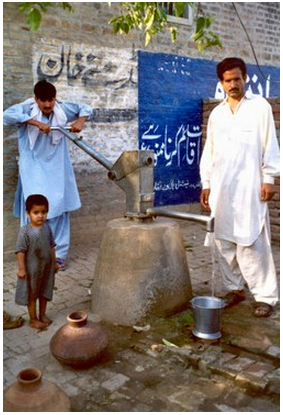Indus pump

The Indus pump is a conventional lever action handpump. It is designed for heavy-duty use, serving communities of 300 persons. The maximum recommended lift is 45 m.
The pump is not fully corrosion resistant; rods are subject to rusting. The Indus pump is a public domain pump defined by RWSN specifications, only used in Afghanistan and Pakistan. It is easy to install and have excellent potential for community-based maintenance. The configuration includes an “open top” cylinder: the piston can be removed from the cylinder without dismantling the rising main. The foot valve is retractable with a fishing tool.
Suitable conditions
Distribution: tens of thousands in Pakistan & Afghanistan.
In Pakistan and in Afghanistan, the use of stainless steel components is uncommon; therefore, these pumps should not be used as substitutes for the Afridev pump.
| Depths to be used: | 45 m |
| Cylinder diameter: | 50.0 mm |
| Maximum Stroke: | 225 mm |
| Approx. discharge (75 watt input): | at 10 m head: 1.4 m³/hour at 15 m head: 1.1 m³/hour |
| Pumping lift: | 10 - 45 m |
| Population served: | ~ 300 people |
| Households: | 30 - 50 hh |
| Water consumption: | 15-20 lt/per capita |
| Type of well: | borehole or dug well |
Construction, operations and maintenance
Pump head, handle and pump stand are made of galvanised steel, pump rods of mild steel, rising main of PVC-U pipe (Ø63 mm), cylinder of PVC-U pipe with brass liner (Ø50 mm), plunger and foot valve are of plastic. This pump is not fully corrosion resistant, the rods are subject to corrosion.
All parts of this pump have a potential for local manufacturing in Afghanistan and Pakistan. Local companies who manufacture PVC-U pipes and have the knowledge of processing engineering plastics are able to produce the “down-hole components”. The cost of the tooling is high and therefore the number of manufacturer will be limited.
Installation of the Indus pump is not difficult and does not need any lifting equipment. It is however recommended that a well-trained crew with the necessary skills perform the installation.
This pump has an excellent “Community Management Potential”, it is reliable, easy to repair by a village caretaker and popular with the communities.